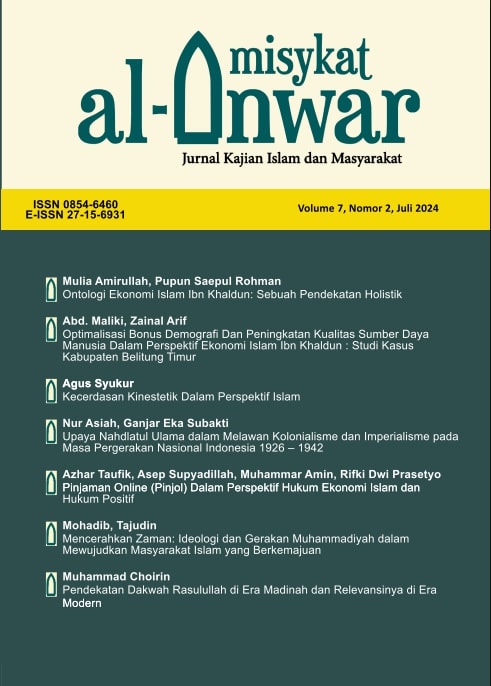Optimalisasi Bonus Demografi Dan Peningkatan Kualitas Sumber Daya Manusia Dalam Perspektif Ekonomi Islam Ibn Khaldun : Studi Kasus Kabupaten Belitung Timur
Isi Artikel Utama
Abstrak
Rincian Artikel
All manuscripts published in the Misykat al-Anwar Journal of Islamic Studies and Society are entirely the property of the author, as for the entry and unpublished script of the journal, the copyright is wholly the property of the author.
All manuscripts published in the Misykat al-Anwar Journal of Islamic Studies and Society are open to the public by following the provisions of the CC-BY-NC-SA (Attribution Non Commercial Share Alike) platform where everyone is allowed and permitted to adapt, the results of the study with the provision should provide citation credit to the author (citation) not for commercial purposes, and one must make a similar provision to the results of his research.
---
Semua naskah yang diterbitkan dalam Misykat al-Anwar Jurnal Kajian Islam dan Masyarakat sepenuhnya menjadi hak milik penulis, adapun naskah yang masuk dan belum diterbitkan oleh jurnal, hak cipta sepenuhnya milik penulis.
Semua naskah yang diterbitkan dalam Misykat al-Anwar Jurnal Kajian Islam dan Masyarakat terbuka untuk umum (open access) dengan mengikuti ketentuan platform CC-BY-NC-SA (Attribution Non Commercial Share Alike) semua orang diperbolehkan untuk menyadur, merujuk dan mengadaptasi tulisan/hasil penelitian dengan ketentuan harus memberikan kredit rujukan kepada penulis (citation) bukan untuk kepentingan komersial, dan seseorang harus melakukan ketentuan yang serupa terhadap hasil penelitiannya.
Referensi
Badan Pusat Statistik. (2020). Keadaan Angkatan Kerja Provinsi Kepulauan Bangka Belitung Agustus 2019 (B. S. S. B. P. K. B. Belitung (ed.)). BPS Provinsi Kepulauan Bangka Belitung.
Hendratno, E. T., & Fitriati, R. (2015). the Study of Indonesia’S Readiness To Cope With Demographic Bonus: a Review of Population Law. Journal of Indonesian Economy and Business, 30(3), 195–219. https://doi.org/10.22146/jieb.10311
Maryati, S. (2015). DINAMIKA PENGANGGURAN TERDIDIK: TANTANGAN MENUJU BONUS DEMOGRAFI DI INDONESIA. ECONOMICA, 3(2), 128. https://doi.org/10.1111/j.1475-4932.1945.tb01164.x
Mujahidin, M. (2018). Munich Personal RePEc Archive Ibn Khaldun’s Economic Thought. 87192.
Novianto, A. (2017). Memperbesar Tentara Cadangan Pekerja: “Bonus Demografi” Dan Ekonomi Politik Negara Neoliberal Di Indonesia. Jurnal Kawistara, 7(2), 187. https://doi.org/10.22146/kawistara.18834
Nuriza, F. A. (2021). STATISTIK DAERAH KABUPATEN BELITUNG TIMUR 2021 (Azhar & Syahroni (eds.)). Badan Pusat Statistik Kabupaten Belitung Timur.
Nurjanah, T. E., & Pramadhira, R. M. (2020). STATISTIK KESEJAHTERAAN RAKYAT KABUPATEN BELITUNG TIMUR 2020 (A. Astiningsih & Syahroni (eds.)). BPS Kabupaten Belitung Timur.
Priyono dan Zainuddin Ismail. (2017). Teori Ekonomi (Teddy Chandra (ed.)). Dharma Ilmu.
Suandi, Junaidi, N. T. M., Lily Rahmawati Harahap, Sri Maryati, Y., Neneng Miskiyah, Sari Lestari ZR, E. G., & Afriyani, F. (2022). Isu Kependudukan dan Pembangunan Berkelanjutan (N. T. Muhyiddin (ed.); Cetakan Ke). Idea Press Yogyakarta.
Sutikno AN. (2020). Bonus Demografi di Indonesia. VISIONER: Jurnal Pemerintahan Daerah Di Indonesia, 12(2), 421–438.
Ulum, B., & Mufarrohah. (2016). Kontribusi Ibnu Khaldun Terhadap Perkembangan Ekonomi Islam Pendahuluan. Jurnal Ekonomi Syariah (IQTISHADIA), 1(2), 17–32.
